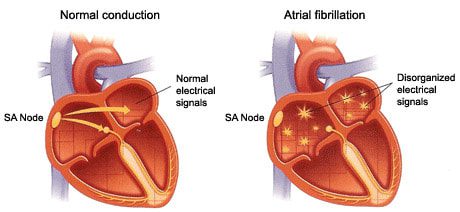Atrial Fibrillation- an irregular condition
Atrial fibrillation(Afib) is an irregular heartbeat that is a risk factor for stroke, heart failure, and lack of blood flow to other organs.
There is a lack of coordination between the two upper chambers(atria) of the heart and the two lower chambers(ventricles). Common symptoms include palpitations felt in the chest, shortness of breath, and lightheadedness.
Afib can come and go or start suddenly and never go away. It is a condition that demands immediate medical attention.
Complications include blood clots forming in the poorly beating atria that can break off and travel to other parts of the body causing ischemia(lack of blood flow).
Interestingly, some people do not even know they have Afib until it is detected during routine physical. Other people will experience weakness, dizziness, confusion, shortness of breath and chest pain.
There are multiple types of Afib. One type is occasional(paroxysmal)- this means that the irregular beat comes and goes and can last a few minutes to a few hours and then goes back to normal without any treatment. Persistent Afib starts and does not end on its own. It can require medications or a mild electric shock(cardioversion) to return to normal. Permanent Afib means the condition does not respond to any treatment. The plan here is to use medication to slow the number of rapid beats sent down to the lower chambers(ventricles).
This allows patients to feel better and improve blood flow to the body.
Possible causes of Afib are hypertension, heart attack, coronary artery disease, certain heart defects you are born with(congenital), overactive thyroid gland, certains medications, caffeine, tobacco, and alcohol. The heart has its own natural pacemaker that can that can fail and cause Afib. A pacemaker can be helpful here. Other causes are lung disease, previous heart surgery, infections, and sleep apnea.
Complications include stroke, which occurs when a blood clot breaks off from the poorly beating atrium and travels to the brain. The clot forms because blood pools in the atrium and coagulates(clots).Risk of stroke increases if you have others medical conditions together with Afib. These include hypertension, diabetes, history of congestive heart failure, or previous stroke. The use of blood thinners greatly reduces the risk of stroke or damage to other organs due to lack of blood flow caused by the clot. Afib can also cause heart failure by not allowing the heart to beat effectively.
Tests used to diagnose Afib include a chest X-ray, blood tests, an exercise stress test, Holter monitoring( a 24 hr EKG recorded with you connected to a monitor the size of an iPod), and an echocardiogram, which is a form of ultrasound that shows the structures of the heart in motion and can detect abnormalities.
Treatment goals are to return the heartbeat to normal, or at least control how fast the heart is beating. The other goals are to prevent blood clots and decrease the risk of stroke. Treating and correcting an overactive thyroid gland can cause the Afib to return to normal heartbeat.
As mentioned, other forms of treatment include oral medications, a brief electric shock (with a sedative),or other more complicated electrical procedures.Blood thinners may or may not be used based on an informed discussion with your doctor.
Afib is a condition not to be ignored if you do not have symptoms.Stroke can be devastating to a person and their family. I urge anyone who reads this to learn how to take your pulse and check it once a day- it could save your life
Keith M. Oshan, M.D.






